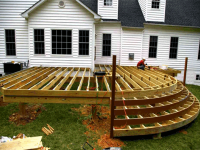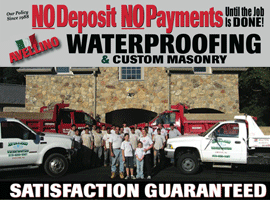No insurance for decommissioned oil tank?
In the current environment, what is a seller required to do with regard to assurances as the the presence of an oil tank; whether by law, regulation or sales practice?
TomR
Tom_R said:
In the current environment, what is a seller required to do with regard to assurances as the the presence of an oil tank; whether by law, regulation or sales practice?
TomR
Best to ask an attorney re the law. As far as I know, law and regulation require that if contamination is found it must be cleaned up prior to transfer by a licensed and insured practitioner, the soil tested and the results certified by the state.
As far as I know there are no regulatory or legal requirements that in ground oil tanks (abandoned or not, and in use or not) be removed or insured. Those are demands made by the buyers usually on the advice of their attorneys. In the last few years I have been aware of several properties in Maplewood that sold with abandoned oil tanks. Both were foreclosures that sold at hundreds of thousands below market value. The buyers were willing to take the risk because they purchased the properties at a fraction of their value. The banks would have done better to remove the tanks.
While I can recognize the harm to our local environment with oil contamination, I question the overall impact this is making. I read an article awhile back about how oil contaminated soil will be dumped in a very vulnerable area by the Rahway River: http://www.nytimes.com/2014/02/25/nyregion/in-plan-to-dump-contaminated-soil-classic-new-jersey-politics-emerge.html
So, what is being. Done with the contaminated soil? Is it better than leaving alone in clay soil where it's fairly contained?
In my fear of this issue since I have a decommissioned tank I researched a bit of other states. Massachusetts has regulations limiting homeowners' financial culpability. It also states that no structure should be moved or compromised for remediation. Instead there's limits placed on the use of that part of your land (no food gardens, etc). Can we start lobbying for changes within NJ
I got an estimate to pull my 1000 gal tank, I had legally decommissioned in 2004, from under my driveway, it was $10,000, just for the pull. God only knows if it was leaking or not, so I am terrified about the remediation that would follow. Tank has been there since house was build in 1923. So I am just going to plan on staying here until I have to leave, or win the lottery!
Emmie: I paid about $2300for my tank pull and it was 1000 gal. It did not include replacing the patio or the permit cost. You might want to get another estimate.
Hauscat, thanks I will do that, but I am retired and on a fixed income, so it won't be easy, either way. Lived in this house since 1975. It is the remediation I am more worried about.
heidia said:
In my fear of this issue since I have a decommissioned tank I researched a bit of other states. Massachusetts has regulations limiting homeowners' financial culpability. It also states that no structure should be moved or compromised for remediation. Instead there's limits placed on the use of that part of your land (no food gardens, etc). Can we start lobbying for changes within NJ
Yes! Thank you for this. My thoughts exactly! As I mentioned earlier, the person who handled our case also handles cases in other states, and she says that NJ is different. I don't believe it is because the environmental benefits are so great that the environmental lobby has pushed for this. Someone is hitting pay dirt.
The current system just encourages people to stick their fingers in their ears until they sell, meanwhile, the tank is down there leaking. If the objective is to keep oil from leaking into the soil, why in the world would you allow people to insure an underground tank and not require they pull it? How about paying an up front 5000 (or whatever) dollars to insure against a leak, but require an immediate pull?
heidia said:
While I can recognize the harm to our local environment with oil contamination, I question the overall impact this is making. I read an article awhile back about how oil contaminated soil will be dumped in a very vulnerable area by the Rahway River: http://www.nytimes.com/2014/02/25/nyregion/in-plan-to-dump-contaminated-soil-classic-new-jersey-politics-emerge.html
So, what is being. Done with the contaminated soil? Is it better than leaving alone in clay soil where it's fairly contained?
In my fear of this issue since I have a decommissioned tank I researched a bit of other states. Massachusetts has regulations limiting homeowners' financial culpability. It also states that no structure should be moved or compromised for remediation. Instead there's limits placed on the use of that part of your land (no food gardens, etc). Can we start lobbying for changes within NJ
+10
emmie said:
Hauscat, thanks I will do that, but I am retired and on a fixed income, so it won't be easy, either way. Lived in this house since 1975. It is the remediation I am more worried about.
As I think this through, it seems to me that the answer depends on your mortgage status (assuming no current tank insurance).
If I had a big mortgage and a tank, I'd probably go ahead and start the process...If I had the unlucky six-digit problem I could then decided whether to simply move and hand the keys to the bank rather than pay both the mortgage and a huge remediation fee.
If I had a paid-off mortgage and a tank, I might wait and hope that a somewhat saner solution becomes available before I need to sell. (e.g. a new program or change in remediation law)
At my house, I worry about the eventual cost of well-encapsulated lead paint (far safer for my family to leave in place than remediate, but a potential future nightmare), since we've removed the basement asbestos as part of a boiler replacement, and since home inspection showed that our home seems to have gone straight from coal to gas.
sarahzm said:
Sweetsnuggles said:You could call Bob Mittermeyer in the Maplewood Building department and ask.
Does anyone know when a NFA (no further action) letter is needed? The sellers of our house pulled the decommissioned UST before we closed on the place. I pulled the permits and found two that apply. One permit is for when the tank was decommissioned. The other permit is for when the tank was pulled in 2012. The town did not have a copy of a NFA letter on file. Is the NFA letter only required if/when remediation takes place?
It is my understanding that an NFA letter is only needed if an oil tank is decommissioned and contamination is found. The NFA letter is issued after a clean up is complete and further tests are negative. If it is a clean pull there is no need for an NFA
That is correct. The prior owner of our house had the tank pulled out a couple of years before we bought it and gave me what I thought was all the paperwork. When we went to sell many years later we discovered that there was no NFA. The company that pulled the tank had reported that they found contamination and remediated it but apparently never filed the final paperwork so the State, after looking into their archives found that it was still an open case! Further, that company was out of business.
Hired Mike Waters who investigated. There was no tank but as soon as they dug down you could actually smell the oil. The cost of excavation, remediation and repaving was approximately $10,000.00. We had to put $ into escrow at closing pending receipt of NFA, which took another 2-3 months.
The good news is that over the last 20 years or so home prices have risen so much in Maplewood that most of us are selling our houses for 3-4 times what we paid. My advice is figure possible problems into the selling price. Of course, that is easier said than done.
A decommissioned tank is not currently leaking.
RobB said:
The current system just encourages people to stick their fingers in their ears until they sell, meanwhile, the tank is down there leaking. If the objective is to keep oil from leaking into the soil, why in the world would you allow people to insure an underground tank and not require they pull it? How about paying an up front 5000 (or whatever) dollars to insure against a leak, but require an immediate pull?
Things may have changed, but even insurance policies that do not cover in ground oil tanks usually do cover remediation if it has spread to a neighbor's property or if any ground water was contaminated. By far, most of the 6 digit remediations fall in one or both of those categories.
A decommissioned tank could still be leaking if it was not done properly. Even if done correctly, there is usually a sludge and some oil left at the bottom of the tank.
Theoretcially the town inspector came by when originally decommissioned and blessed the empty tank as 'worthy of filling with sand or foam'. We had a 1500 tank pulled for $2300 (we used the guys who originally decommissioned tank). Bob Mittermeier passed the tank again. That was it. Done.
Suppose a tank was decommissioned and inspected long ago with proper permit. Now, many years later, the tank is pulled and some contamination is discovered. Wouldn't the homeowner be able to file a legal claim against the company that decommissioned the tank?
When they decommission a tank, they cut a hole in the top of it, empty it, and 'wipe' it clean. Town inspector comes with his flashlite and says "I see no holes!" They fill the tank. The tank filling company would not be held responsible since he got the inspector's okay.
I guess in some cases the inspector may see no holes, but maybe there was a small hole that was overlooked. So if that was the case, when you go to pull the tank 30 years later, the old oil might have leached into the soil from when the tank had been actively used, and then the town inspector will say "I see a hole! and I smell oil!" Then you'll have to do some digging. But the digging company would not be liable.
So I guess it comes down to a crap shoot: stay in the house till you die or pull the tank and hope for no big problems...
LOL, those are your choices! But I wouldn't lose too much sleep over it... i have heard many many stories of people getting de-commissioned tanks pulled annd voila, no problems. I felt very good going in to this process by contacting the company that closed my tank as well as speaking with Mittermeier.
I would suggest that if you schedule this work, be home when they are there so you can see what they are doing and you can ask questions, etc. and also stay home until the inspector comes.
Yup, makes sense. Sigh. One more hassle that could have been avoided.
heidia said:
In my fear of this issue since I have a decommissioned tank I researched a bit of other states. Massachusetts has regulations limiting homeowners' financial culpability. It also states that no structure should be moved or compromised for remediation. Instead there's limits placed on the use of that part of your land (no food gardens, etc). Can we start lobbying for changes within NJ
Yes, a change in the laws is what is required. Along with the above mentioned common sense regulations, there should be an insurance pool. Every insurance company operating in the state should be required to participate, and if you have a tank on your property, you pay a nominal annual surcharge which goes to the pool. In combination with the above common sense regulations which would limit remediation costs, this problem could completely go away.
A homeowner should not be liable for hundreds of thousands of dollars in remediation costs for something that was installed likely before they were born. Fires caused by 75 year old faulty wiring are covered by insurance. Trees that are 100 years old and fall down doing damage are also covered. Why are oil tanks singled out? It's a nightmare scenario that could bankrupt a person.
What we have is a copy of a certificate provided by a tank pulling company stating that the tank was properly removed and no contamination was found. This is over 20 years old. I have no idea whether the certificate is worth the paper it is printed on.
I am sure the reason that insurance companies don't insure oil pollution cleanup is that it is potentially open-ended. Storm and fire-damage, by contrast, it quite well understood and can be quantified.
Ours was one of the positive outcomes. We knew that our house had been oil heated at one time but it had been more than 50 years since the house had been switched to gas heat when we decided to pull the in ground tank as part of a planned project to redo the driveway. The decommissioned tank was uncovered. The inspector found no sign of contamination. The tank was removed. Much of the cost of pulling the tank was absorbed by the cost of the new driveway. Now there is no in ground tank left to worry about.
A Man bought a home in Edison in the year 2012. Before purchasing the home the man had a home inspection. No underground oil tank was detected during the home inspection. In February of 2017 the man decided to sell his home. Being that Edison is a popular area prospective buyers lined up at the door. While under contract one prospective buyer had an oil tank sweep done on the property. A tank was identified and subsequently removed. During the removal is was found that the oil tank was leaking. The prospective buyer backed out of the contract, all previously interested buyers were now no longer interested, and the man was given a quote to clean up the contamination for $20,000. Moral of the story is to do the proper due diligence on the property, get an oil tank sweep. This article explains it well http://usaoiltankremovalnj.com
Ding ding ding! What Rob said.
The issue of oil tanks in NJ is ridiculous. Homeowners have been completely screwed by the lawmakers, insurance companies, and oil companies. Big money wins! Homeowners lose.
Rob_Sandow said:
heidia said:
In my fear of this issue since I have a decommissioned tank I researched a bit of other states. Massachusetts has regulations limiting homeowners' financial culpability. It also states that no structure should be moved or compromised for remediation. Instead there's limits placed on the use of that part of your land (no food gardens, etc). Can we start lobbying for changes within NJ
Yes, a change in the laws is what is required. Along with the above mentioned common sense regulations, there should be an insurance pool. Every insurance company operating in the state should be required to participate, and if you have a tank on your property, you pay a nominal annual surcharge which goes to the pool. In combination with the above common sense regulations which would limit remediation costs, this problem could completely go away.
A homeowner should not be liable for hundreds of thousands of dollars in remediation costs for something that was installed likely before they were born. Fires caused by 75 year old faulty wiring are covered by insurance. Trees that are 100 years old and fall down doing damage are also covered. Why are oil tanks singled out? It's a nightmare scenario that could bankrupt a person.
What we have is a copy of a certificate provided by a tank pulling company stating that the tank was properly removed and no contamination was found. This is over 20 years old. I have no idea whether the certificate is worth the paper it is printed on.
I agree - we need to talk to our state reps and ask them to start the process of changing the law - not post about it here. Who's in?
Rob_Sandow said:
heidia said:
In my fear of this issue since I have a decommissioned tank I researched a bit of other states. Massachusetts has regulations limiting homeowners' financial culpability. It also states that no structure should be moved or compromised for remediation. Instead there's limits placed on the use of that part of your land (no food gardens, etc). Can we start lobbying for changes within NJ
Yes, a change in the laws is what is required. Along with the above mentioned common sense regulations, there should be an insurance pool. Every insurance company operating in the state should be required to participate, and if you have a tank on your property, you pay a nominal annual surcharge which goes to the pool. In combination with the above common sense regulations which would limit remediation costs, this problem could completely go away.
A homeowner should not be liable for hundreds of thousands of dollars in remediation costs for something that was installed likely before they were born. Fires caused by 75 year old faulty wiring are covered by insurance. Trees that are 100 years old and fall down doing damage are also covered. Why are oil tanks singled out? It's a nightmare scenario that could bankrupt a person.
What we have is a copy of a certificate provided by a tank pulling company stating that the tank was properly removed and no contamination was found. This is over 20 years old. I have no idea whether the certificate is worth the paper it is printed on.
The bolded part is so scary. Something that you didn't even know was on your property can now be the thing that can send you into financial ruin b/c of the remediation costs. We dealt with one in our investment property in Middlesex county. We were one of the "lucky" ones in that there was no remediation necessary. But, we were under contract to sell the property and now we had to dig up the driveway to get at this oil tank, which was decommissioned properly by a former owner. The day the tank came out of the ground was one of the most stressful days I've had in recent memory. Again, we were lucky b/c our buyer understood the process and was buying the property as an investment and knew that a new driveway was needed anyway. This did lessen our profit from the property by over $5K. Again, we were one of the "lucky" ones.
Sponsored Business
Promote your business here - Businesses get highlighted throughout the site and you can add a deal.





























@xavier67--Thanks. That's helpful info.